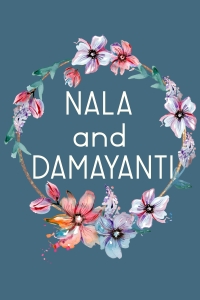
Once upon a time, there reigned in Nishadha a great rajah of choicest virtues named Nala. He had great skill in taming steeds; he was a peerless archer and was devoted to truth. Nala commanded a mighty army. His splendour was like the sun, and he was exalted over all other kings like the monarch of the gods. He had great piety, and he was deeply read in the Vedas, but he was ever a passionate lover of dice. Many a high-born lady spoke his praises, for he was generous of heart and self-controlled and the guardian of the law. Indeed, Nala was a very present Manu.
Now there ruled over the neighbouring state of Vidarbha the mighty rajah Bhíma, the terrible in strength, who was likewise of choicest virtues. He was childless, and he yearned for children. For long, he had been devoted to perform many holy deeds intent upon offspring, but without avail. It chanced, however, that one day there came to his court a Bráhman named Damana. Hospitable welcome was accorded him by the child-desiring Bhíma, for the seer was feasted in the hall with the rajah and his royal consort. After that, a boon was conferred upon the queen. She became the mother of one sweet girl, the pearl of maidens, who was named Damayantí, and of three noble sons, Dama, Danta, and the renowned Dam’ana, who all grew great and powerful.
When fair Damayantí had attained the full bloom of her beauty, she was unequalled throughout the world for her brilliance and for her grace. Upon the faultless and slender-waisted maiden, there waited, as about Indra’s queen, a hundred female slaves and a hundred virgin handmaids, and she shone among them, decked with jewels and rich ornaments, like to the goddess of beauty, unrivalled and without a peer. Never among the gods, or the Yakshas, or among mortal men was a maiden more fair ever heard of or ever beheld than soul-disturbing Damayantí, who disturbed the souls of the gods.
In the presence of Bhima’s sweet daughter, the high-born ladies of Vidarbha took joy in constantly praising Nala, that tiger among rajahs. Likewise, before Nishadha’s king, was Damayantí ever extolled because of her beauty. So it fell that, hearing much of each other’s virtues, the silent passion of love was nurtured in both their hearts.
Impatient grew Nala as his love increased, and he used to wander in a grove within his palace garden musing secretly upon the maiden of faultless form. One day he saw walking in the grounds a flock of beautiful swans with wings all flecked with gold. The rajah crept forward softly and seized one, and much he marvelled to hear it cry out in human language.
“Slay me not, O gentle king, and to you I will render a service, for I will praise you in the presence of Damayantí so that ever after she shall think of no other mortal man but you.”
Immediately Nala set the bird at liberty, and it flew away rejoicing with its bright companions towards Vidarbha. When they reached the ladies’ garden of Bhima’s palace, they settled down at the feet of Damayantí, who was reposing in the shade with her virgin handmaids. All the fair young women gazed in wonder on the swans, admiring their graceful forms and their plumage gleaming with gold, and before long, they began to pursue them among the trees. Then of a sudden, the bird which Damayantí followed spoke to her in human language and said:
“Damayantí, hear! The noble king Nala dwells in Nishadha. Comely is he as a god, nor can his equal be found in the world. You are the pearl of women, and he is the pride of men. If you were to marry to him, then would perfect beauty and noble birth be united. Blessed indeed would be the union of the peerless with the peerless.”
Wondering, the maiden listened while the bird conversed thus strangely, and then she said: “Speak also to Nala in this manner.”
The swan made answer: “So be it,” and thereupon took flight with the others to Nishadha, where it related to Nala all that had taken place.
Ever after that day, Damayantí ceased to live for herself alone and all her thoughts were given up to Nala. She desired most to sit apart in silent reverie; the bloom faded from her cheeks, and she grew dejected and melancholy. Indeed, the maiden yielded up her soul to sorrow, and much she sighed in secret, gazing upward and meditating, for love had taken possession of her heart. She did not find pleasure in sleep, or in gentle converse, or in merry banquets either. In the midst of her broken slumbers, she was prone to weep and cry out: “Oh, woe is me!”
The virgin handmaidens read her heart, and they went before her sire and told that his gentle daughter was pining for the monarch among men. When Bhima heard this, he pondered deeply what should be done for Damayantí and perceived that her time for the swayamvara had come. So he summoned all the high-born rajahs upon earth, saying: “O heroes of the world, come to the swayamvara.”
Then did the whole land resound with the trampling of elephants and horses and the rumbling of chariots, for the stately princes, followed by their armies, swarmed towards the court of Bhima. By the strong lord of Vidarbha were they welcomed with honour, and they sat upon their thrones.
Now it happened that at this time, two wise sages, Nárada and Párvata, ascended to Swarga, the heaven of Indra, and they saluted the Cloud-compeller within his palace. The immortal lord bade them welcome and asked how it fared with the world. Narada said it fared well with the world and with all the mighty kings. Then Indra spake, saying: “Where are all the royal heroes? Why do they not come here as my honoured guests?”
The wise sage made answer and said: “O Cloud-compeller, the great rajahs cannot appear before you because even now they are hastening one and all to the swayamvara of Damayantí, the renowned daughter of Bhima, the fairest woman upon earth. O slayer of drought demons, every king seeks to woo this maid of transcending beauty, for she is the pearl of all the world.”
As Narada spake, the other gods drew nigh and listened to his stately utterance. Then together, they exclaimed with rapture: “We also will go there.” In an instant, they were hastening through the air in their chariots towards the city of Vidarbha to mingle with the wooers of Bhima’s fair daughter.
Meanwhile, Nala had set forth with joy, his heart full of love for Damayantí. The gods beheld him standing upon the surface of the earth with radiance like to the sun, and they arrested their course, gazing in mute wonder, for he was as comely as the god of love. Then, dropping down through the blue air, they hailed the stately hero, saying: “Do as we now as of you, O most excellent of princes. Be the bearer of our message.”
Nala adored the gods with folded hands and promised to obey their will, saying humbly: “Who are you that now command my service?”
Indra spoke and said: “Lo! We are the dread guardians of the world. I am Indra, lord of heaven; this is Agni, god of fire; here is Varuna, king of the waters; and there is Yama, lord of the dead. You must inform Damayantí that we have come to woo her and say to her: ‘Choose as your husband one of the celestial beings’.”
Nala made answer with folded hands, saying: “Send me not, I entreat you, upon this mission. How can I who am enamoured with the maiden, plead aright the cause of another. In mercy spare me, gods—spare me this unwelcome service.”
But the gods would not be moved from their purpose. They reminded Nala he had already promised to do their will, and they, therefore, urged him to set forth without delay lest he should belie his words.
Then the lord of Nishadha pleaded: “The palace of Bhima is strongly guarded, and I cannot enter there.”
Indra said: “You will indeed enter.”
And lo! Even as the god spoke, Nala found himself standing before Damayantí in her secret bower.
The beauteous maiden was surrounded by her virgin band, and he gazed upon her faultless limbs and slender waist and into her entrancing eyes. Her shining beauty excelled even the tender rays of the moon. The love of Nala grew deeper and stronger as he looked upon the smiling princess, but he curbed his passion, remembering his mission.
All the maidens gazed with wonder and joy at the noble form, and in their hearts, they exclaimed: “Oh! The splendid one; oh! the strong and mighty hero—who is he? Is he god, or Yaksha, or Gandharva?” But they spoke not a word, for they were made bashfully silent because of his beauty.
Nala smiled upon Damayantí, and she smiled softly in return. She exclaimed in her wonder: “Who are you that has come here like a celestial being to awaken all my love. Speak and tell, O sinless lord. How did you enter the palace unseen, for surely all the chambers are strongly guarded by stern orders of the king?”
The rajah made answer, saying: “O you fairest one, know now that I am Nala, and that I come here as the messenger of the gods Indra and Agni, Varuna and Yama, and through their power have I entered here, unseen nor stayed, for it is their desire that I should say to you: ‘Choose, O princess, for thine husband one of the celestial beings’. Such is the purpose of my mission from the great world guardians. Having heard me, you may decide as you will.”
Damayanti at once did homage to the gods. Then she smiled upon Nala and spoke, saying: “Lo! I am your already, and whatsoever I possess is yours as well. O give me your love in return, Nala. For know that my heart’s love was increased by the endearing words of the swan, and it is because of you that the rajahs are all gathered here now. If you will despise me, I will suffer death for your sake by fire, or by water, or even by the noose.”
The rajah made answer and said: “Will you reject, the gods, and choose for your husband a mortal who is more lowly than the dust they walk upon? Let your heart aspire to them. Remember, too, that the man who incurs the anger of the world’s dread guardians will meet with certain death. From such a fate oh shield me, you fairest one!... So choose one of the perfect gods, and you shall have robes unsullied by dust, garlands that never fade, and celestial joy without end.”
Trembling, and with tear-dimmed eyes, Damayantí said: “I do homage with due humility to all the gods, but oh! I desire you for my husband, thee and thee only.”
But Nala said: “I am charged with the mission of the celestial beings, and cannot plead for myself now. But afterwards I will come to claim you, and will speak boldly, O bright one, so remember me in your heart.”
The maiden smiled through her tears. “Ah!” she said, “I see now a way of escape. When you come to the swayamvara, enter together with the gods, and I will name you as mine own, so that no sin may be charged against you.”
Then Nala returned to the gods, who waited for him eagerly, and he told them all that the maiden had said, word for word. “In your wisdom,” he added, “you will judge of what remains, O ye excelling gods.”
When at length the day of happy omen, the day of the swayamvara, arrived, Bhima summoned at noontide all the love-sick rajahs. They passed through the court of golden columns and under the bright portal arch and entered the Hall of State like lions on the mountains. The rajahs were then seated on their thrones, adorned with garlands and with dangling ear gems. The arms of some were robust and powerful like the battle mace; others were delicate and smooth as a serpent. With profuse and flowing hair, shapely noses, and arching eyebrows, the faces of these great lords were radiant as the stars in heaven. As a mountain cave is full of tigers, so was Bhima’s great Hall full of rajah tigers on that day.
When Damayantí entered in state, every eye and every soul was entranced by her dazzling beauty. All these lords of earth gazed upon her with unmoving eyes. The name of each rajah was proclaimed in turn. Nala, looking about her, was suddenly stricken with dismay, for she perceived that there were present five Nalas who were undistinguishable in form and attire one from another. The four gods who desired to win her had each assumed the likeness of her beloved one. Which ever of these she gazed upon, he seemed to be her rajah, and in her secret heart she wailed: “How can I discern Nala among the celestial beings?”
In her sore distress, the trembling maiden folded her hands and did homage before the gods, to whom she prayed, saying:
“When I heard the sweet words of the swans, I pledged my heart to Nala. I ask of you by this truth, O ye gods. Oh! Reveal my lord.
“From my faith, I have never swerved either by word or by deed. I beg of you by this truth, O ye all-knowing Powers. Oh! Reveal my lord.
“The gods have destined that Nala should be my husband. I pray by this truth. Oh! Reveal my lord.
“The vow which I so pledged to Nala is holy, and I must ever keep it. I adjure you by this truth. Oh! Reveal my lord.
“O mighty ones, guardians of the world, assume now your forms divine, so that I may know Nala, the monarch of men.”
The gods heard the sad maiden’s piteous prayer and marvelled greatly. They perceived that her resolve was firm, that she was constant in truth and in love, and was holy and wise, and that she remained faithful to her lord. So they revealed the tokens of their greatness. Then Damayantí was able to discern the four celestial beings because their skins were without moisture and their eyes never winked, there was no dust on their garlands, and their feet did not touch the earth. She also knew Nala because he cast a shadow; there was dust on his raiment, and his garland was beginning to fade; drops of moisture stood on his skin, and his eyelids moved.
Gazing first upon the celestial beings and then upon him, who was her heart’s desire, Damayantí named Nala as her lord. She modestly touched the hem of his garment and threw round his neck a wreath of bright flowers and thus chose him for her husband.
All the rivals of Nala uttered cries of sorrow, but the gods and the sages exclaimed aloud: “Well done! Well done!” and honoured the lord of Nishadha.
Nala spoke in his joy to fair Damayantí, saying: “Since you, O maiden with serene smile, have chosen me as your husband in the presence of the gods, know that I will be a faithful consort who will ever take delight in your words. I am yours, and so long as my life endures I will be yours only.”
So did the lord of Nishadha pledge his faith, and the heart of the maiden was made glad. The happy pair then did homage before the gods, and these resplendent guardians of the earth bestowed, in their joy, eight surpassing gifts upon Nala. Indra gave him the power to behold the godhead in the sacrifice and power to walk untroubled by any obstacle anywhere he desired; Agni gave him control over fire and power over the three worlds; Varuna gave him power over water and power to obtain fresh garlands at will, and Yama gave him subtle skill in preparing food, and excellence in every virtue. Each of the gods also conferred his double blessing upon Nala, and after that, they departed.
All the rajahs wondered greatly when they beheld the maiden’s choice confirmed in this manner, and they went away as they came, with joy, and returned to their own domains.
Bhima rejoiced greatly when the happy bridal was celebrated in pomp and with state. He bade Nala goodbye with great courtesy when that great lord of Nishadha, after fitting stay at Vidarbha, set out to return to his native city with the pearl of women he had won.
Now it chanced that when the gods had left the swayamvara, they met in the midst of the blue air Kali, the demon of evil, who was accompanied by the wicked spirit Dwápara. Indra, the slayer of giants, said: “Where are you going with Dwápara, O Kali?”
Kali made answer: “We are hastening to the swayamvara, for it is my desire to obtain Damayantí as my bride.”
Smiling, the king of gods said: “The bridal is now arranged and ended, for lo! The fair Damayantí has chosen Nala for her husband in our presence.”
When he heard these words, the heart of Kali was made angry, and he exclaimed: “Since she has preferred a mortal in presence of the celestial beings, let her choice be her own doom.”
But the gods said: “Know that our consent was freely given, because Damayantí has chosen for herself a husband endowed with all the virtues, and equal even to the guardians of the world. If anyone should chance to curse Nala, the curse will recoil fatally, and the curser will be cast into the torments of the dark lake of hell.” Having spoken thus, the bright deities ascended the heavens.
Then said Kali to Dwapara: “I cannot now control my fierce wrath. Lo! I will be avenged upon Nala, for I will enter his body, and he will lose his kingdom and of his bride. You, Dwapara, will enter the dice and give me your aid.”
So was a malignant compact arranged between the demon of evil and his darksome ally, and together they went towards Nishadha to haunt the stately palace of Nala, waiting for the fatal moment.
This story was first written by Donald Alexander Mackenzie. It has been adapted for Readomania by our editorial team.
About the Author







Comments